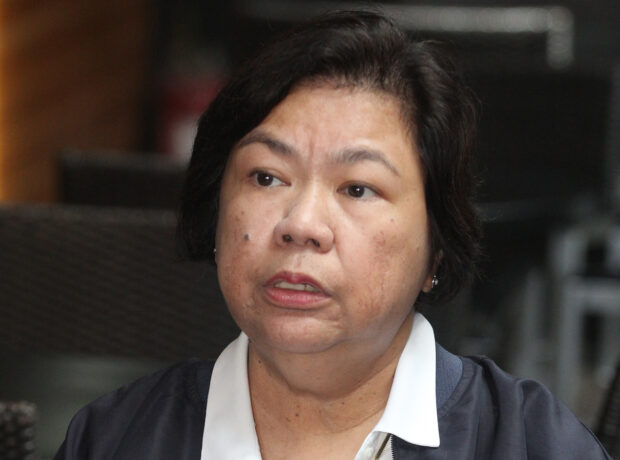
Department of Migrant Workers Secretary Susan Ople (Photo by NIÑO JESUS ORBETA / Philippine Daily Inquirer)
MANILA, Philippines — The Department of Migrant Workers (DMW) has drawn up a “simplified” and “rights-based” rules on the hiring of land-based overseas Filipino workers (OFWs), replacing the seven-year-old guidelines crafted by its forerunner.
Migrant Workers Secretary Susan Ople on Friday signed the new 2023 rules and regulations governing the recruitment and employment of OFWs. The new set of guidelines will replace the old rules issued in 2016 by the Philippine Overseas Employment Administration (POEA), the predecessor of DMW.
Under the new rules, a one-strike policy, or an immediate cancellation of license, will be imposed on erring recruitment agencies that commit what the DMW called “cardinal sins” — 20 grave offenses which it had identified.
“Once [the agency] is ordered closed, it can’t be a zombie agency that resumes operations after a certain number of months,” Ople said at a press briefing.
According to the DMW chief, serious offenses that could not be remedied include “acts of graft and corruption, including attempts to bribe DMW officials and personnel, as well as the recruitment and deployment of minors.”
Any involvement in corruption, including the “padrino” system among labor attachés and other officials, is a ground for the revocation of license and is a new provision under the new rules, Ople added.
Illegal fees
Other grave violations include collecting placement fees in countries where no such policy is in place; passing on to the worker fees that are chargeable only to the employer; refusing or failing to act on cases of death, physical and sexual abuse, and psychological impairment; engaging in recruitment in jobs that are harmful to life, public health, morality, and human dignity.
Also considered “cardinal sins” are the following:
- human trafficking
- gross misrepresentation or giving false information
- reprocessing workers through a job order for a nonexistent work and through a job order of another agency
- changing ownership or control of a single proprietorship
- deploying workers whose records were not processed by the DMW
- allowing a foreigner to head or manage a licensed agency
- allowing a foreign manning agency to own or participate in a Philippine-based agency
- deploying a worker recruited by a foreigner
- allowing illegal agents to conduct activities on behalf of the DMW
- altering a processed contract
- imposing compulsory health exams or training from specific entities, unless cost is shouldered by agency
- imposing compulsory loan from a specific institution or person
- becoming an officer or board member of any corporation or partnership in a travel agency by any of the proponents
Agencies found committing “less serious offenses” will be ordered to suspend operations for up to a year, and those with “light offenses” will be suspended for one to six months.
Rights protection
Aside from busting corrupt practices among manning agencies and government personnel, the new DMW rules seek to ensure that the workers’ rights are protected as the accommodation provided by agencies for OFWs will now be regulated.
“This is significant because there was no way for the government to know where these accommodations are and how conducive their facilities are for our workers. Under the new rules, they would have to inform us about the location and capacity of these accommodations,” Ople said. The new guidelines will also require licensed recruitment agencies to hire a full-time welfare desk officer, who will monitor and assist in the resolution of the complaints raised by OFWs.
“We aim for a rights-based approach and ease-of-doing business mindset to labor migration and migration governance,” Ople said.
License validity
Other significant provisions include the extension of the validity period of provisional licenses from two years to three years, while the validity of a regular license was extended to six years from the previous four-year period.
The escrow deposit of recruitment agencies has also been increased to P1.5 million from P1 million “to expand their capability to cover claims of OFWs over employment contract violations,” Ople said.
The DMW also shortened its turnaround time to up to 10 days for onsite accreditation and verification in its Migrant Workers Offices (MWO) in other countries.
The “simplification” of the DMW guidelines was in line with the directives from President Marcos during his first State of the Nation Address, Ople said.
It is expected to take effect by July, as it has yet to be made public in a newspaper and be formally launched at the University of the Philippines Law Center this month. The DMW is also planning to draft another set of new guidelines for seabased OFWs.
There are around 10 million Filipinos working abroad and they play a crucial role in shoring up the Philippine economy. In 2021, they remitted $31.4 billion and this amount rose to $32.5 billion in the following year.